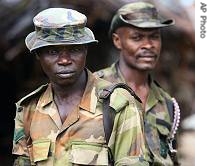2006年VOA标准英语-Nigeria's Delta Leaders Criticize Military Crac(在线收听)
By Gilbert da Costa
Abuja
27 August 2006
 Two Nigerian army soldiers stand guard in Ikang, near Calabar in the Niger Delta area of Nigeria, Monday, August 14, 2006 |
||
-----
Residents of the Port Harcourt neighborhood in the Delta say the troops became angry late Thursday after gunmen killed a soldier at a local bar, prompting the troops to go on a rampage that led to the burning of hundreds of slum houses in Port Harcourt.
A military spokesman in the area, Major Sagir Musa, denies that Nigerian troops were responsible for the rampage or that they are targeting innocent people.
"These are wild allegations, allegations that really are unfounded, dubious. Militants and their collaborators are not happy on what we are doing in our efforts," said Major Musa. "In some cases, the same militants disguise in army uniforms and perpetrate dastardly acts with the aim of tarnishing the image of the Nigerian army. We are not targeting any place maliciously."
The soldier killed by the gunmen had been stationed at the bar to protect foreign workers. After the killing, the gunmen kidnapped two oil workers. They are the latest to be abducted in the oil-producing Niger Delta region.
So far this month, kidnappers have taken at least 19 foreign oil workers hostage in the Delta. Three are still missing, while the others have been released. Nigerian troops killed 10 militants in an ambush last week.
Ledum Mitee, a community leader in the Niger Delta, says the troops should make a greater effort to distinguish between criminals and law-abiding citizens.
"We are getting very worried about the indiscriminate operation by the military because many innocent people, some communities and settlements have already come under attack and I think that there should be a deliberate effort to discriminate between who are the criminals and ordinary citizens who, because of their poverty, have been forced to stay in settlements," said Mitee. "Yesterday, some people were shot, today I'm hearing some communities have come under attack and people have been displaced."
Nigeria is the world's eighth largest oil exporter, but over the last seven months attacks in the Delta have reduced oil output by 500,000 barrels per day, a 20 percent decline over previous production.